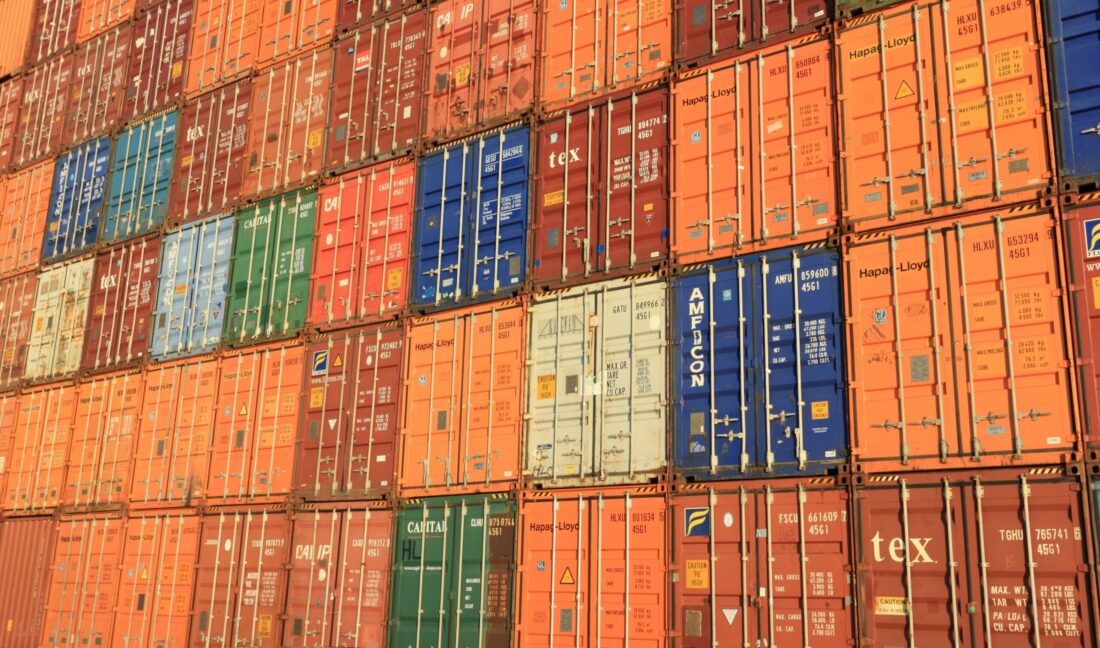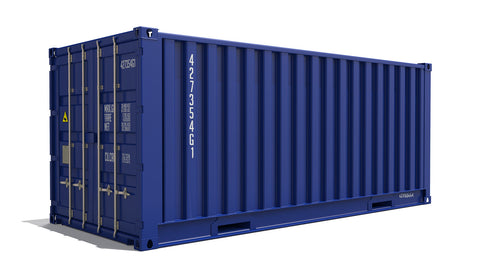Everything You Required to Know About Shipping Containers and Their Practical Applications
Shipping containers have advanced from plain tools for transportation to flexible frameworks with various useful applications. Their durable style and standard sizing make them perfect for a variety of uses past shipping. From innovative housing options to lasting farming, their adaptability is noteworthy. The possibilities do not end there. Exploring their different functions discloses unusual understandings into modern obstacles and imaginative services. What various other roles could these containers play in today's globe?
The Design and Framework of Shipping Containers

Inside, containers are created to optimize room, commonly featuring wood or steel flooring that can support considerable weight. Air flow systems might be included to prevent dampness buildup, which is essential for delicate freight. In addition, reinforced edges allow for easy handling by forklifts and cranes, promoting smooth loading and dumping. This thoughtful design and structure add to the containers' adaptability across various delivery and storage space applications.
Advantages of Using Shipping Containers
While many transport techniques have their benefits, the usage of delivery containers sticks out because of their unrivaled versatility and performance. Shipping containers offer a standard dimension, making them easy to pile and transport throughout various modes of transport, consisting of ships, vehicles, and trains. This standardization reduces loading and unloading times, consequently enhancing overall efficiency.
Furthermore, delivering containers are created from long lasting materials, providing robust protection for items during transit. They are safe and weather-resistant, decreasing the danger of damage from ecological elements or burglary. In addition, the modular style of delivery containers permits for very easy personalization, enabling services to adjust them for different objectives, such as storage space or mobile offices.
Lastly, their transportability and cost-effectiveness make shipping containers an appealing option for services aiming to streamline logistics and supply chain operations. These advantages add to the growing popularity of shipping containers in various industries.
Innovative Housing Solutions With Shipping Containers
Cutting-edge real estate remedies have emerged as an exciting application of delivery containers, leveraging their inherent strengths for property use. These versatile frameworks offer a lasting choice to conventional structure products, typically at a fraction of the cost. Engineers and designers have changed containers right into stylish, practical homes, satisfying varied way of lives and choices.

Shipping containers are eco friendly, advertising recycling and decreasing waste. Lots of tasks concentrate on power performance, including environment-friendly roofings and solar panels. As urbanization boosts, these innovative real estate remedies present a functional action to real estate lacks while cultivating a distinct architectural visual.
Shipping Containers in Retail and Pop-Up Shops
An expanding number of stores are transforming to shipping containers as a vibrant remedy for pop-up shops and retail areas. These versatile structures provide a cost-efficient option to conventional shops, permitting businesses to create one-of-a-kind, eye-catching settings that bring in customers. Their modular design allows very easy transportation and installation, making them ideal for seasonal or temporary retail areas.
Stores can personalize shipping containers to reflect their brand name identity, transforming them into aesthetically appealing shops that stand out in jampacked marketplaces. The small nature of containers also urges reliable use of room, enabling creative layouts that maximize client circulation and involvement. Moreover, delivering containers can be located in unconventional areas, such as metropolitan parks or uninhabited whole lots, raising ease Web Site of access and foot traffic.
As the retail landscape advances, shipping containers provide a ingenious and versatile remedy that fulfills the needs of modern-day customers while boosting the buying experience.
Lasting Farming Practices Utilizing Shipping Containers
Sustainable farming methods progressively include shipping containers as ingenious options for agriculture - shipping containers for sale near me. These container farms use hydroponics to take full advantage of room and resource efficiency, using a cost-efficient approach to food production. By changing shipping containers into agricultural centers, farmers can attend to food safety and environmental concerns all at once
Container Farming Perks
While conventional farming faces difficulties such as land shortage and climate adjustment, container farming provides a feasible option that optimizes space and sources. This ingenious technique allows for year-round plant manufacturing in regulated atmospheres, lowering dependence on weather. Container farms use much less water than conventional farming, promoting sustainability and conservation. They can be established in city areas, bringing fresh fruit and vegetables closer to customers and decreasing transportation exhausts. Additionally, the modular nature of delivery containers allows scalability, permitting farmers to change procedures based on need. Container farming likewise decreases chemical use by creating an enclosed environment, inevitably improving food safety. As urban populaces grow, container farming becomes a useful service to satisfy the increasing need for regional, sustainable food sources.
Hydroponics in Containers
Hydroponics, which permits plants to grow without dirt by utilizing nutrient-rich water, grows within the boundaries of shipping containers, making it an ideal approach for urban farming. These containers create a regulated atmosphere that enhances humidity, temperature, and light, allowing year-round growing. With restricted area in urban locations, delivering containers use a scalable remedy for growing fresh fruit and vegetables. Hydroponic systems within containers can include various techniques, such as nutrient film technique (NFT) and deep water society (DWC), which take full advantage of yield while reducing water use. This innovative method not only boosts food safety and security but likewise minimizes the carbon footprint linked with typical farming techniques. Hydroponics in containers stands for a forward-thinking option for lasting city food manufacturing.
Cost-Effective Farming Solutions
As food manufacturing faces increasing challenges because of climate change and urbanization, delivering containers become an economical service for agriculture. These functional frameworks can be repurposed for various lasting farming techniques, such as hydroponics and vertical farming. By making use of regulated environments within containers, farmers can maximize development cycles and reduce resource usage, consisting of water and plant foods. Additionally, delivering containers can be purposefully placed in metropolitan areas, decreasing Resources transport costs and boosting accessibility to fresh fruit and vegetables. Their modular nature permits scalability, enabling farmers to increase procedures as need grows. Repurposing containers contributes to squander decrease, lining up with eco-friendly farming efforts. Generally, shipping containers present ingenious opportunities for efficient and sustainable food manufacturing.
Emergency Situation and Catastrophe Alleviation Applications of Shipping Containers

Organizations often use shipping containers to develop mobile centers or area hospitals, guaranteeing that treatment gets to those in requirement. Additionally, they can be changed into command facilities for working with rescue operations, therefore improving organizational performance during dilemmas.
Additionally, containers can be customized to keep necessary items such as food, clothes, and water, securing materials up until they are dispersed. Their movement enables them to be easily transferred to different locations, making certain that assistance gets here where it is most urgently needed. Generally, shipping containers play a crucial duty in boosting the effectiveness page of calamity relief efforts worldwide.
Regularly Asked Inquiries
Exactly How Are Shipping Containers Transported From One Location to An Additional?
Shipping containers are delivered through trains, trucks, and ships, making use of cranes for packing and unloading. This multi-modal transport system ensures efficient motion across land and sea, attaching global supply chains and helping with global profession.
What Is the Ordinary Lifespan of a Delivery Container?
The typical life expectancy of a shipping container generally varies from 10 to 25 years, depending on upkeep, usage, and environmental aspects. Appropriate treatment can expand their use, while neglect might bring about damage and damages.
Can Shipping Containers Be Customized for Different Uses?
Yes, shipping containers can be customized for various uses. They work as homes, workplaces, pop-up shops, and storage space units. Their convenience allows for imaginative adjustments, making them suitable for a broad variety of applications.
Are Shipping Containers Environmentally Friendly?
Shipping containers can be eco-friendly, as they promote repurposing and recycling. Their durability lowers waste, while their use in different real estate and organizations minimizes the demand for new materials, adding to sustainable practices.
How Do I Select the Right Size Shipping Container?
To choose the appropriate size shipping container, one need to assess storage space demands, think about the desired usage, and assess space availability - Shipping Containers for Sale. Usual sizes consist of 40-foot and 20-foot containers, each offering various storage space and transportation needs properly
Cutting-edge real estate options have actually arised as an amazing application of delivery containers, leveraging their integral strengths for household use. The flexibility of delivery containers enables for creative designs, from single-unit residences to complex multi-container plans. Lasting farming practices significantly incorporate shipping containers as cutting-edge remedies for farming. Additionally, the modular nature of shipping containers makes it possible for scalability, allowing farmers to change procedures based on need. Hydroponics, which permits plants to grow without soil by utilizing nutrient-rich water, grows within the confines of delivery containers, making it an excellent approach for urban farming.